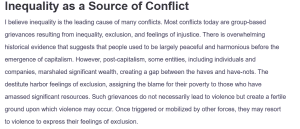Inequality as a Source of Conflict
I believe inequality is the leading cause of many conflicts. Most conflicts today are group-based grievances resulting from inequality, exclusion, and feelings of injustice. There is overwhelming historical evidence that suggests that people used to be largely peaceful and harmonious before the emergence of capitalism. However, post-capitalism, some entities, including individuals and companies, marshaled significant wealth, creating a gap between the haves and have-nots. The destitute harbor feelings of exclusion, assigning the blame for their poverty to those who have amassed significant resources. Such grievances do not necessarily lead to violence but create a fertile ground upon which violence may occur. Once triggered or mobilized by other forces, they may resort to violence to express their feelings of exclusion.
Looking at most conflicts within and among countries, it is common to find an element of poverty attached to them. There is a close link between a nation’s wealth and conflicts such as civil war. The risk of civil war is particularly inherent in rich countries where the gap between the rich and the poor is huge. Notably, the elite play a huge role in stirring ideological conflicts by turning unfocussed resentment into actionable grievances. For instance, the American Civil War that began in 1861 was motivated by inequality. The war was caused by elite Southerners who felt that they needed slave workers to maintain their power and economic advantage.
Overall, conflicts are mostly caused by feelings of inequality, exclusion, and injustice. Such inequality manifests politically, economically, and socially. Politically, marginalized groups can rise against the ruling elite if they feel excluded from political opportunities. On the other hand, feelings of economic inequality are mostly unfocused resentment but can be triggered to become full-blown conflicts. Therefore, competition, power inequalities, and economic inequalities are largely to blame for most conflicts among humans.
ORDER A PLAGIARISM-FREE PAPER HERE
We’ll write everything from scratch
Question
Law and Order
When we look at early governments, like those of Egypt and Sumer, one of their main functions was to create and enforce laws. Generations of historians and philosophers have been interested in how and why these governments and their laws came to be.
Many of the conflicts, problems, and threats addressed in ancient law codes like the Code of Hammurabi are familiar to us: theft, murder, assault, and breach of contract. Over thousands of years, we have not eliminated these social problems. I want to present a very simplified version of two theories about the roots of conflict; please let us know which theory is more convincing to you and why.

Inequality as a Source of Conflict
Option A: Conflict arises because people are naturally selfish. Pre-historic human societies were brutal and violent, but laws and governments exist to curb our worst instincts and enforce good behavior.
Option B: Conflict arises because of social inequality. Early humans were, by their nature, good people, but social stratification, wealth and power corrupted their good nature

